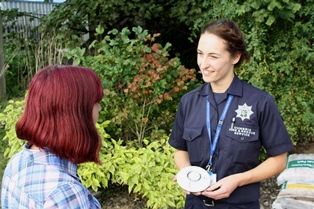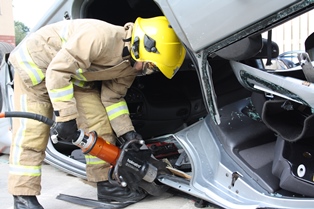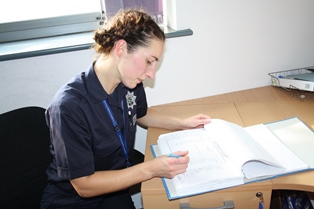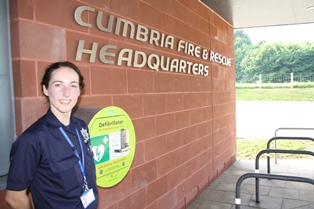Fulltime Firefighter Recruitment - Day in the life
We spoke with Cumbria Fire and Rescue Service Wholetime Firefighter Kasey Grainger, see what Kasey had to say about the role:
9am - The shift starts with a parade where I will be told my duties for the day, these include routine tasks, checking over the fire appliance and ensuring equipment such as breathing apparatus, cutting gear and first aid, I make sure all the equipment is on the appliance and in good working order.
9.30am - We carry out operational training every shift, this varies each day, it could consist of wearing Breathing Apparatus to carry out a simulated search and rescue, or using the hydraulic cutting equipment to practice the cutting techniques and procedures carried out when attending road traffic collisions. Today we are carrying out a working at height drill which involves rescuing a casualty from the roof of the training fire house.
11am - We're off to a site visit at a former gasworks tank that's due to be decommissioned. We assess the site for potential risks or hazards, noting there's limited access if more than one fire appliance should need to come here. We discuss safety issues with staff from demolition contractor and confirm how gas and electricity services can be isolated in the event of an incident on site. All information is logged on our computer system so it can be shared with colleagues.
12pm - Next we go to a property to meet the occupier for prearranged home safety visit. Every household in Cumbria is eligible to apply for a free home safety visit to help them deal with potential fire hazards in their home. We give general fire safety advice, like ways to avoid blocking access and suggesting escape routes in the event of a fire. We can also fit free smoke alarms where needed - they definitely help save lives. We'll also assess a property for potential hazards - in this property we check where the gas cylinders are stored, for example. Home safety visits are also a good opportunity to familiarise ourselves with local street layouts and check where water can be accessed in an emergency. Again all this information is logged, to help colleagues prepare for any future incidents in the area.
12.45pm - Our home safety visit ends early when we're called to a road traffic accident on the M6. Appliances from Kirkby Stephen and Shap are also attending, along with police, paramedics and two doctors. One vehicle is involved - it's come off the motorway between Penrith and Tebay and has ended up lying precariously on some banking. One casualty needing urgent medical attention - she has suspected neck and spinal injuries - and is trapped inside the vehicle. On arrival, we cone off the first lane of the motorway as a safety precaution. We use winching and stabilising equipment to secure the vehicle on the banking while we use specialist cutting equipment to release the passenger from the vehicle. After carefully placing the casualty on a spinal board, she's then taken to hospital by air ambulance.
1.30pm - We return to the fire station. The fire appliance is refuelled, we check all our equipment and kit is on board and ready for our next call-out, and then fill out the necessary paperwork to verify this has been done. It's all standard procedure when we return from an incident.
1.45pm - We eventually get time for some lunch!
2.30pm - But not for long - we get called out to an automatic fire alarm at a commercial premises. On arrival, we check the property for any indications of a fire but there's no sign of anything untoward. Some automatic alarm systems are highly sensitive, you'd be surprised what can trigger them, even flying insects or aerosol can spray. We contact the alarm supplier, arrange for them to check over the system and head back to station.
3.15pm - We're off to visit one of the pre-school playgroups in the town. We do a number of these visits to schools and playgroups, it's a really good opportunity to talk to the children about our work and pass on some fire safety advice, especially in the run-up to Bonfire Night. We also give demonstrations using equipment like breathing apparatus and the children also get to go inside the fire appliance, which is always popular!
4.30pm - Back at the fire station, I log into our computer system and add key information about the property where we did a home safety visit earlier. This could be very useful in the event of a fire at the premises. For example, it will tell us if the occupier has mobility issues, making it harder to escape the building, or if any flammables like petrol or diesel are stored nearby.
5pm - We've recently acquired new breathing apparatus which has some clever built-in communication technology. We need to make full use of this, so I read through the manual and familiarise myself with the new equipment. As a crew we then wear the equipment and practice using the new technology.
5.30pm - Time to catch up on some admin. I add details of today's tasks to my personal development record programme. They help show the experiences and competences I have gained as a firefighter, really useful for career progression.
6pm - Another busy day ends and it's home time as we make way for the night shift to take over.
How long have you been a firefighter?
I joined Cumbria Fire and Rescue in 2012 as a retained firefighter based in Wigton. I've been a wholetime firefighter since March 2014, part of my role includes recruitment. Before joining the fire service, I worked as a secretary in a law firm.
Why did you become a firefighter?
It's something I've always wanted to do. I used to watch London's Burning (TV drama about firefighters) when I was at school. I've always wanted to work in a job that challenges me - I want to push myself to be the best that I can be at my job.
What are the best things about your job?
I work with some great people in the fire service and I'm doing different things every day - no two days are ever the same. I enjoy the challenges that the job brings, learning new skills and being pushed out of my comfort zone.
What's the most memorable incident you've worked on?
There are too many to mention! For me, the most important part of my job is being there to help people when they need our assistance, whether it's putting out a property fire, offering fire safety advice to someone during a home safety visit, or talking to children about fire safety awareness.
How much training does a firefighter do?
We work on training and fitness all the time. I'm not obsessive about going to the gym but I do constantly work on my fitness to keep it at the right level. We also do regular drills, such as practising rescues from smoke-filled premises in a simulated building at the fire station. Being a firefighter can often involve using a lot of equipment, so we also need to do lots of reading to make sure we're up to speed and fully aware of policies and procedures to follow during any incident.



